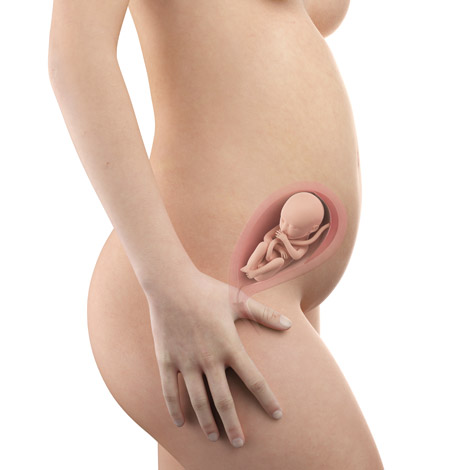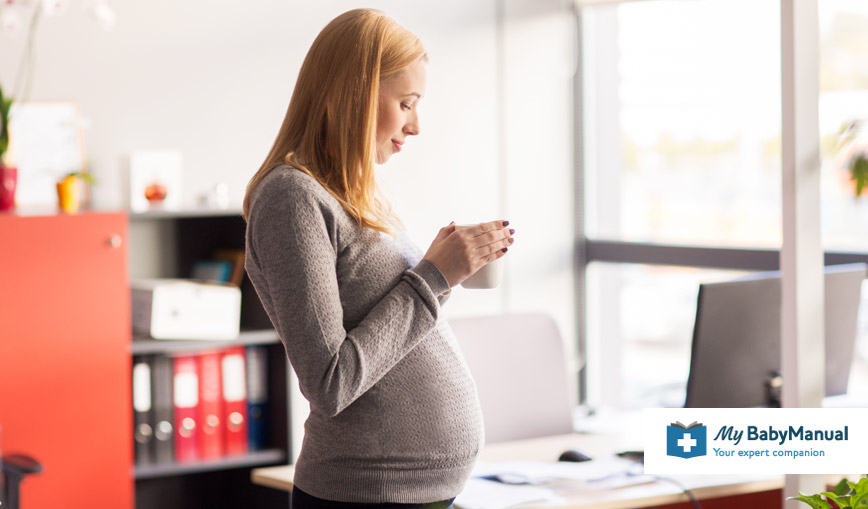Your baby this week
GRAMS IN WEIGHT
Her skin will appear red as her heart beats more strongly.
Her bone marrow will start producing red blood cells.
Your baby may start responding to sounds.
How big is your baby?
She is now the size of a large mango, weighing 500g (1.1lb) and measuring 28.9cm (11.4in).

How big is your baby?
She is now the size of a large mango, weighing 500g (1.1lb) and measuring 28.9cm (11.4in).

What does your baby look like?
Your newborn miniature is busy alternatively stretching and flexing her limbs and having quiet periods of sleep this week as she develops her sleeping/waking cycle. Her skin will appear red as her heart begins to beat more strongly and more blood is pumped around her body.
Changes in your body this week
Your growing bump is starting to push your other organs out of the way. Your uterus will move your ribcage up and out which can make you feel breathless, your stomach is more squashed which can lead to heartburn and your baby will be putting more pressure on your bladder which means it’s back to the early days as you find yourself visiting the loo more frequently again.
How your baby is developing
Sounds are the next big thing in your unborn baby’s life. She’s been used to hearing your voice for a while, but now she’ll be hearing more distant noises such as your partner drilling and hammering in the soon-to-be nursery or a car alarm sounding outside.
She may also start responding to certain sounds, and you know what that means? This is your opportunity to introduce her to your taste in music.

How your baby is developing
Sounds are the next big thing in your unborn baby’s life. She’s been used to hearing your voice for a while, but now she’ll be hearing more distant noises such as your partner drilling and hammering in the soon-to-be nursery or a car alarm sounding outside. She may also start responding to certain sounds, and you know what that means? This is your opportunity to introduce her to your taste in music.

In other news, up until this point red blood cells were being produced by your baby’s liver and spleen, but now her bone marrow will take over.
Health concerns
It’s entirely possible that you might be suffering from constipation by this stage in your second trimester. Caused in part by the hormone progesterone slowing down food absorption from your bowel, and partly from your baby pushing down on your rectum, constipation affects around half of all pregnant women. You may feel embarrassed to discuss it, but your midwife and GP will have heard it all before. Tips for helping you to poo more easily include drinking plenty of water and eating a diet high in fibre, fruit and vegetables. Try not to strain on the toilet as this can often cause anal fissures (small tears) and painful haemorrhoids (piles).
Are there any symptoms you should be looking out for?
Exercise during pregnancy is good in general, but there are some warning signs which mean you’re probably overdoing it. These include:
- Dizziness
- Heart palpitations
- Any nausea/vomiting
- Pelvic or back pain
- A sudden change in body temperature
- Hot and cold flushes and clammy hands
- Sudden swelling
If you are experiencing one or more of these, that’s your signal to slow down and stop; take time to rest properly. More serious warning signs during exercise, which should never be ignored are:
- Any vaginal leaking or bleeding
- Sudden, sharp calf pain
- Blurred vision
- Fainting
- Severe abdominal pain
- A noticeable reduction in fetal movement
All of these symptoms require immediate medical attention.
Safety first
It’s almost time to start thinking about how you plan to make your home baby-ready. If there are any major changes to be carried out, such as building renovations, then it’s best to do these before baby arrives. One of the first, and most important, things you should be doing is checking that your smoke and carbon monoxide detectors are working. Then make a list of any other jobs to be done, in priority order.
And don’t worry unnecessarily about items such as baby gates (unless you have pets) and socket protectors just yet – these will be your focus once your baby starts moving around your home freely.
For now, just think about the ways you can make your home safer and friendlier for you as you cope with the demands of a newborn – you may need to think about rearranging your kitchen to accommodate a sterilising unit and all the clean feeding paraphernalia you might need. Perhaps also think about safe routes to get to your baby in the middle of the night – there’s nothing worse than stubbing your toe or tripping over something as you stumble, bleary-eyed towards the screaming infant in the Moses basket at 3am.

Important issues this week
By week 23 of pregnancy you need to inform your employer of when you’d like to start your maternity leave. All pregnant employees qualify for 26 weeks maternity leave and you can choose to take another 26 on top of that if you so wish. If you take the whole year off, then you will have used all of your statutory maternity leave. If you can’t, or don’t want to do this, you and your partner can opt for shared parental leave. Leave for partners is paid at the same rate as maternity pay. Websites such as GOV.UK will help you work out your full entitlement and how to split it if that’s what you want to do.
Keeping fit, staying healthy
Some women choose to continue to run during their pregnancy. As long as you adapt your routine to suit your changed, pregnant body then running is fine. However, during the second trimester your centre of gravity changes, as does your centre of balance as your bump expands, which leaves you more vulnerable to falls or slips. Only run on flat surfaces and if you do fall then either fall to the side or break your fall with your hands and knees, not your tummy – and make sure you have a working phone with you at all times if you are exercising alone.
Looking forward; planning ahead
With your new baby comes new responsibilities. Now is the time to think about writing a Will if you don’t already have one, setting up a savings account and checking the terms of your health insurance to see if you can include your child. None of these are urgent priorities, but taking care of the little things as you go along makes it easier to handle the bigger picture overall.



